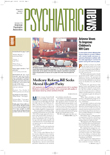“Do not treat us as lab rats; treat us as part of the solution,” said Jacki McKinney, M.S.W., a mental health consumer advocate. McKinney was discussing the role of consumers in the research process at a conference on this topic sponsored by the Center for Mental Health Services (CMHS) in March in Baltimore (see facing page). CMHS is part of the the Substance Abuse and Mental Health Services Administration (SAMHSA).
Her current participation in a SAMHSA-funded study of women with co-occurring disorders and violence in Albany, N.Y., has marked a personal turning point. “We’re empowered because we’ve demanded to learn about the research system,” she said. “Researchers have turned to us and asked us what we think.”
CMHS is a strong advocate of consumer involvement in health care planning, delivery, and research (Psychiatric News, April 20). CMHS uses the term “consumer” in recognition of and respect for the fact that it is used by patients and former patients to identify themselves; it is also used by advocates and others who work on behalf of mental health causes. What was once known as the patient advocacy movement is now more commonly referred to as the consumer movement.
Consumers often have little idea of how the research system actually works. For instance, McKenney participated as a subject in one study in which the researchers finished data collection and—from her point of view—“disappeared.” In fact, they were merely analyzing data, but the research participants were never informed. “We thought they had abandoned us,” she recalled.
Paolo del Vecchio, M.S.W., a consumer affairs specialist at CMHS, said,”We’ve moved from simple informed consent, to protecting subjects, to getting consumers involved on token levels, to getting them involved in planning or serving on institutional review boards, to hiring consumers to run research projects and get paid for their expertise. The next step is for consumers to become principal investigators or sit on boards of directors.”
Consumers and their families, however, feel a number of tensions involving research, he continued. For a start, they are mistrustful, given previous mistreatment by the mental health system. They sense disparities in money and power, relative to academic research communities, and often believe their own experiential form of knowledge is devalued in comparison with academic standards of knowledge. Finally, consumers often misunderstand concepts taken for granted by researchers. They may see a contradiction between their voluntary participation and the randomization called for in some protocols.
Both McKinney and del Vecchio called for more efforts to integrate consumers into the research process and to acclimate researchers and consumers with each other.
